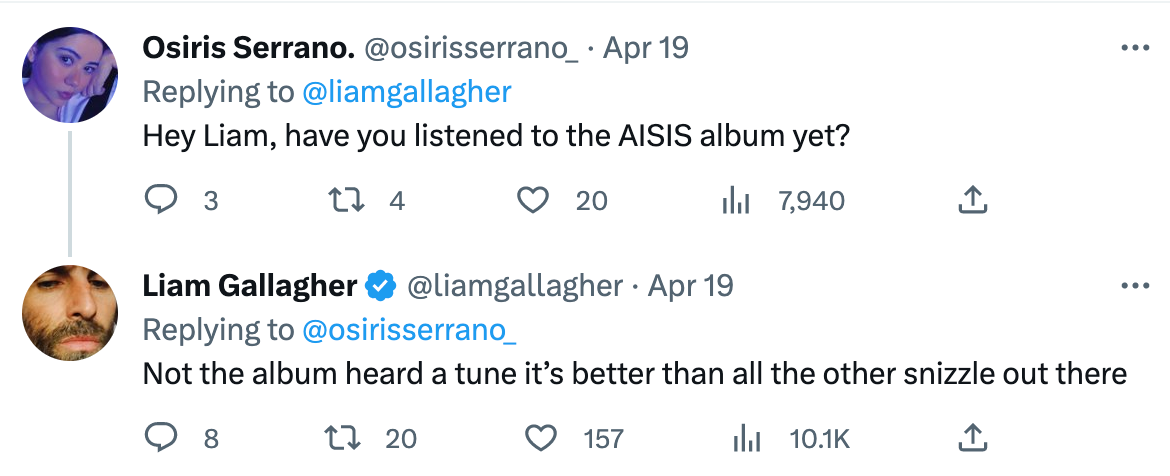Liam Gallagher shares verdict on AI-generated Oasis album by ‘AIsis’
The eight-track album – titled The Lost Tapes Volume One and under the name AIsis– featured music and lyrics written by a real-life band, but using Gallagher’s AI-generated vocals
Your support helps us to tell the story
From reproductive rights to climate change to Big Tech, The Independent is on the ground when the story is developing. Whether it's investigating the financials of Elon Musk's pro-Trump PAC or producing our latest documentary, 'The A Word', which shines a light on the American women fighting for reproductive rights, we know how important it is to parse out the facts from the messaging.
At such a critical moment in US history, we need reporters on the ground. Your donation allows us to keep sending journalists to speak to both sides of the story.
The Independent is trusted by Americans across the entire political spectrum. And unlike many other quality news outlets, we choose not to lock Americans out of our reporting and analysis with paywalls. We believe quality journalism should be available to everyone, paid for by those who can afford it.
Your support makes all the difference.Liam Gallagher has offered up his thoughts after an Oasis album created by artificial intelligence went viral.
Last week, an “alternative reality concept album” imagining another Oasis album featuring the band’s 1995 to 1997 line-up went viral online, sparking further debate about the future of music and AI.
The eight-track album – titled The Lost Tapes Volume One and under the name AIsis– featured music and lyrics written by the real-life band Breezer, but with Liam’s AI-generated voice singing them.
On Wednesday (19 April), the former Oasis frontman shared his verdict on the AIsis album.
Asked his thoughts, on Twitter, Liam replied: “Not the album heard a tune it’s better than all the other snizzle out there.”
In a follow-up tweet, the 50-year-old said that he thought the song was “mad as f***”, adding: “I sound mega.”
On the AIsis album, which features tracks such as “Out of My Mind” and “Coming of Age”, Breezer said that the concept was based on the idea “where the band’s 95-97 line-up continued to write music, or perhaps all got together years later to write a record akin to the first 3 albums, and only now has the master DAT tape from that session surfaced”.

“We’re bored of waiting for Oasis to reform, so we’ve got an AI modelled Liam Gallagher… to step in and help out on some tunes that were written during lockdown 2021 for a short-lived, but much loved band called Breezer,” they wrote, adding that they had another set of Oasis-inspired songs which may also be released.
The topic was hotly debated by Piers Morgan on his TalkTV show, in a segment questioning if AI was a “threat”.
Speaking to The Guardian, Breezer musician Bobby Geraghty said that many people had assumed the music and lyrics were written by AI too.
Enjoy unlimited access to 100 million ad-free songs and podcasts with Amazon Music
Sign up now for a 4 month free trial (3 months for non-Prime members)
Enjoy unlimited access to 100 million ad-free songs and podcasts with Amazon Music
Sign up now for a 4 month free trial (3 months for non-Prime members)

“I don’t think that’s possible yet,” he said. “AI is still very much controlled by the user. You need to feed it exactly what it needs to replicate. I don’t think it’s at the point where AI could write a song. Although, having said that, a lot of people have asked if the music was AI generated, which it’s not.”
It comes after an AI-generated “collaboration” between Drake and The Weeknd went viral online, horrifying fans with its “terrifying accuracy”.
The song, titled “Heart on My Sleeve”, was later pulled from streaming services such as Apple Music, Spotify, Deezer and Tidal.
It is in the process of being removed from TikTok and YouTube, following criticism from Universal Music Group, who claimed the song violated copyright law.




Join our commenting forum
Join thought-provoking conversations, follow other Independent readers and see their replies
Comments